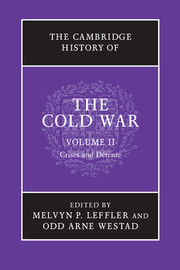Book contents
- Frontmatter
- 1 Grand strategies in the Cold War
- 2 Identity and the Cold War
- 3 Economic aspects of the Cold War, 1962–1975
- 4 The Cuban missile crisis
- 5 Nuclear competition in an era of stalemate, 1963–1975
- 6 US foreign policy from Kennedy to Johnson
- 7 Soviet foreign policy, 1962–1975
- 8 France, “Gaullism,” and the Cold War
- 9 European integration and the Cold War
- 10 Détente in Europe, 1962–1975
- 11 Eastern Europe: Stalinism to Solidarity
- 12 The Cold War and the transformation of the Mediterranean, 1960–1975
- 13 The Cold War in the Third World, 1963–1975
- 14 The Indochina wars and the Cold War, 1945–1975
- 15 The Cold War in the Middle East: Suez crisis to Camp David Accords
- 16 Cuba and the Cold War, 1959–1980
- 17 The Sino-Soviet split
- 18 Détente in the Nixon–Ford years, 1969–1976
- 19 Nuclear proliferation and non-proliferation during the Cold War
- 20 Intelligence in the Cold War
- 21 Reading, viewing, and tuning in to the Cold War
- 22 Counter-cultures: the rebellions against the Cold War order, 1965–1975
- 23 The structure of great power politics, 1963–1975
- 24 The Cold War and the social and economic history of the twentieth century
- Bibliographical essay
- Index
- References
4 - The Cuban missile crisis
Published online by Cambridge University Press: 28 September 2010
- Frontmatter
- 1 Grand strategies in the Cold War
- 2 Identity and the Cold War
- 3 Economic aspects of the Cold War, 1962–1975
- 4 The Cuban missile crisis
- 5 Nuclear competition in an era of stalemate, 1963–1975
- 6 US foreign policy from Kennedy to Johnson
- 7 Soviet foreign policy, 1962–1975
- 8 France, “Gaullism,” and the Cold War
- 9 European integration and the Cold War
- 10 Détente in Europe, 1962–1975
- 11 Eastern Europe: Stalinism to Solidarity
- 12 The Cold War and the transformation of the Mediterranean, 1960–1975
- 13 The Cold War in the Third World, 1963–1975
- 14 The Indochina wars and the Cold War, 1945–1975
- 15 The Cold War in the Middle East: Suez crisis to Camp David Accords
- 16 Cuba and the Cold War, 1959–1980
- 17 The Sino-Soviet split
- 18 Détente in the Nixon–Ford years, 1969–1976
- 19 Nuclear proliferation and non-proliferation during the Cold War
- 20 Intelligence in the Cold War
- 21 Reading, viewing, and tuning in to the Cold War
- 22 Counter-cultures: the rebellions against the Cold War order, 1965–1975
- 23 The structure of great power politics, 1963–1975
- 24 The Cold War and the social and economic history of the twentieth century
- Bibliographical essay
- Index
- References
Summary
In October 1962, the Cold War endured its most perilous passage – and humanity survived its closest brush with the ultimate man-made catastrophe: a thermonuclear war between the United States and Soviet Union that could have incinerated scores of cities and killed half a billion people, rendered much of the northern hemisphere uninhabitable, lacerated industrial civilization, and stamped a lethal exclamation point on a century already twice bloodied by outbursts of global carnage that would now pale in comparison.
On its surface, the Cuban missile crisis involved a single discrete set of circumstances: It stemmed from Soviet leader Nikita S. Khrushchev’s secret dispatch of nuclear missiles to Fidel Castro’s revolutionary Cuba and US president John F. Kennedy’s determination to reverse that deployment – and climaxed during the famous “13 Days” “eyeball-to-eyeball” ”on the brink” (the crisis birthed so many clichés that one can string them together to evoke it) extending from Washington’s detection of the missiles in mid-October to Khrushchev’s coerced consent to remove them on October 28.
Yet, any serious analysis requires assessing how multiple narratives converged to bring the Cold War to its tensest apex. Most broadly, the crisis starkly dramatized the chasm between ends and means that Hiroshima portended for international affairs. Cuba itself represented a vital interest for neither the United States nor the Soviet Union; both proclaimed their ideological contest should be decided through gradual historical processes, not war; and both Khrushchev and Kennedy sought their political goals short of a hazardous military collision.
- Type
- Chapter
- Information
- The Cambridge History of the Cold War , pp. 65 - 87Publisher: Cambridge University PressPrint publication year: 2010
References
- 6
- Cited by

